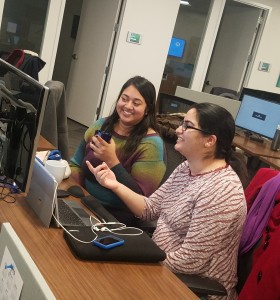Maria Qadri graduated from Rutgers University in January 2018 with a Ph.D. in Biomedical Engineering and Quantitative Biomedicine. Prior to that, she received her M.S. in Biomedical Engineering from the University of Connecticut and her B.S. in Biomedical Engineering from the University of Hartford. At Rutgers, she was highly involved in the formation of the Science Policy and Advocacy at Rutgers group and was also one of the founding members of the iJOBS blog. She was also a Rutgers Academy for the Scholarship for Teaching and Learning Fellow and a PreDoctoral Leadership Development Institute Fellow.  1) What have you been up to since graduating? In the summer before I completed my degree, I moved to Washington, DC. Based on my previous networking, I was keeping an eye out for open positions with Ripple Effect. I initially applied for a part-time, on-call position as a government comment coder; however, during the phone interview, the interviewer reviewed my resume and noticed my strong interest in science policy. The science policy project manager conducted an in-person interview and decided I was a good fit for their Internship Program. During my time in the program, I served as a Program Management and Policy intern working 40 hours a week from August 2017 until my graduation date in January 2018. I worked on the implementation of the NIH’s new clinical trials policy that focused on updating the language related to Funding Opportunity Announcements. Based on Ripple Effect’s project needs, I then moved to their Research and Evaluation team. There, I worked on a few open-comment coding projects and an evaluation of the Centers of Excellence for Influenza Research and Surveillance that involved taking interview notes, qualitative coding of the interviews, and a very extensive literature review. All government laws create rules or modify rules, and each proposed rule goes through a solicitation for public comment. Once gathered, all those comments must be read, categorized, and reported on before the rule can be enacted. In my role as a comment coder, I worked on the Medicare Access and CHIP Reauthorization Act, the Quality Payment Program, and the International Pricing Index for Medicare Part B Drugs. Since my work with the Research and Evaluation team was also part-time on call work, I also served for a short time as an editorial assistant with the American College of Radiology’s (ACR) press team. This involved work on both their membership magazine, The Bulletin, as well as their peer-reviewed scientific journal, The Journal of the American College of Radiology. Ripple Effect found the need for my skills on a few more projects, and in June 2018, I transitioned to the Communications and Outreach team where I have worked on projects for the Military Health System Research Symposium scientific journal and the Health Care Payment Learning and Action Network’s annual summit. 2) How did you approach the job search process? Through networking at conferences and learning about various companies through iJOBS, I had compiled a list of approximately 10 companies that I focused on, routinely checking their openings page. Ripple Effect was one of those 10. Once I got to DC, I leveraged my network for source openings and set up an alert for tweets related to #scipoljobs. I still have them! In the absence of leads, I used job aggregators like ZipRecruiter and Indeed for low-effort job applications to increase the number of jobs I applied to, which was actually how I found the ACR position. 3) What got you interested in this field? My first taste of
1) What have you been up to since graduating? In the summer before I completed my degree, I moved to Washington, DC. Based on my previous networking, I was keeping an eye out for open positions with Ripple Effect. I initially applied for a part-time, on-call position as a government comment coder; however, during the phone interview, the interviewer reviewed my resume and noticed my strong interest in science policy. The science policy project manager conducted an in-person interview and decided I was a good fit for their Internship Program. During my time in the program, I served as a Program Management and Policy intern working 40 hours a week from August 2017 until my graduation date in January 2018. I worked on the implementation of the NIH’s new clinical trials policy that focused on updating the language related to Funding Opportunity Announcements. Based on Ripple Effect’s project needs, I then moved to their Research and Evaluation team. There, I worked on a few open-comment coding projects and an evaluation of the Centers of Excellence for Influenza Research and Surveillance that involved taking interview notes, qualitative coding of the interviews, and a very extensive literature review. All government laws create rules or modify rules, and each proposed rule goes through a solicitation for public comment. Once gathered, all those comments must be read, categorized, and reported on before the rule can be enacted. In my role as a comment coder, I worked on the Medicare Access and CHIP Reauthorization Act, the Quality Payment Program, and the International Pricing Index for Medicare Part B Drugs. Since my work with the Research and Evaluation team was also part-time on call work, I also served for a short time as an editorial assistant with the American College of Radiology’s (ACR) press team. This involved work on both their membership magazine, The Bulletin, as well as their peer-reviewed scientific journal, The Journal of the American College of Radiology. Ripple Effect found the need for my skills on a few more projects, and in June 2018, I transitioned to the Communications and Outreach team where I have worked on projects for the Military Health System Research Symposium scientific journal and the Health Care Payment Learning and Action Network’s annual summit. 2) How did you approach the job search process? Through networking at conferences and learning about various companies through iJOBS, I had compiled a list of approximately 10 companies that I focused on, routinely checking their openings page. Ripple Effect was one of those 10. Once I got to DC, I leveraged my network for source openings and set up an alert for tweets related to #scipoljobs. I still have them! In the absence of leads, I used job aggregators like ZipRecruiter and Indeed for low-effort job applications to increase the number of jobs I applied to, which was actually how I found the ACR position. 3) What got you interested in this field? My first taste of careers in science policy came from attending the American Association for the Advancement of Science’s (AAAS) Catalyzing Advocacy in Science and Engineering (CASE) workshop while I was at Rutgers. This workshop opened my eyes to the need for scientists who can communicate complex topics to policy makers and influencers. From there, I co-founded and led the National Science Policy Group’s Rutgers’ Chapter, which now is the Science Policy and Advocacy at Rutgers group (Twitter @SciPolRU). This opportunity allowed me to connect and bring speakers to campus whom were working in positions that I was interested in as well as conduct informational interviews. I also attended AAAS’ annual meeting, which opened my eyes to even more career options related to science communication and science policy than I was previously aware of. 4) How did you use skills that you learned during your graduate school career to transition into your current role? Were there any specific activities that you did during graduate school that helped you gain these essential skills? One remarkable takeaway from my graduate career that enticed both Ripple Effect and the American College of Radiology was my involvement in writing and editing for the iJOBS blog because that highlighted communication skills that are essential in any role in industry. I was able to give very specific examples that highlighted my detail-oriented approach to both formal and informal communication. 5) Do you have any general advice for current PhD students preparing for the next step in their careers? Internships are a great way for you to gain transferable skills and explore company culture. If you can’t commit to an internship, the shadowing opportunities through iJOBS are also a great way to gain some real-world experience. Informational interviews are a must-do throughout your degree. I did at least one a month, once I was post my PhD quals. Don’t be afraid to ask for help and feedback from anyone – I sent my resume to CEOs, faculty at other universities, my cohort, my fellowship peers, and pretty much anyone who had a pulse. I also sourced friends in different departments for different perspectives. You don’t have to take everyone’s advice but getting multiple perspectives on submission documents is very useful. Thank you so much, Maria, for telling us about your journey—so many helpful tips for those considering careers in science policy and communications. Best of luck moving forward! Paulina Krzyszczyk led this interview with Maria Qadri. This post was also edited by Eileen Oni.
careers in science policy came from attending the American Association for the Advancement of Science’s (AAAS) Catalyzing Advocacy in Science and Engineering (CASE) workshop while I was at Rutgers. This workshop opened my eyes to the need for scientists who can communicate complex topics to policy makers and influencers. From there, I co-founded and led the National Science Policy Group’s Rutgers’ Chapter, which now is the Science Policy and Advocacy at Rutgers group (Twitter @SciPolRU). This opportunity allowed me to connect and bring speakers to campus whom were working in positions that I was interested in as well as conduct informational interviews. I also attended AAAS’ annual meeting, which opened my eyes to even more career options related to science communication and science policy than I was previously aware of. 4) How did you use skills that you learned during your graduate school career to transition into your current role? Were there any specific activities that you did during graduate school that helped you gain these essential skills? One remarkable takeaway from my graduate career that enticed both Ripple Effect and the American College of Radiology was my involvement in writing and editing for the iJOBS blog because that highlighted communication skills that are essential in any role in industry. I was able to give very specific examples that highlighted my detail-oriented approach to both formal and informal communication. 5) Do you have any general advice for current PhD students preparing for the next step in their careers? Internships are a great way for you to gain transferable skills and explore company culture. If you can’t commit to an internship, the shadowing opportunities through iJOBS are also a great way to gain some real-world experience. Informational interviews are a must-do throughout your degree. I did at least one a month, once I was post my PhD quals. Don’t be afraid to ask for help and feedback from anyone – I sent my resume to CEOs, faculty at other universities, my cohort, my fellowship peers, and pretty much anyone who had a pulse. I also sourced friends in different departments for different perspectives. You don’t have to take everyone’s advice but getting multiple perspectives on submission documents is very useful. Thank you so much, Maria, for telling us about your journey—so many helpful tips for those considering careers in science policy and communications. Best of luck moving forward! Paulina Krzyszczyk led this interview with Maria Qadri. This post was also edited by Eileen Oni.
iJOBS Blog